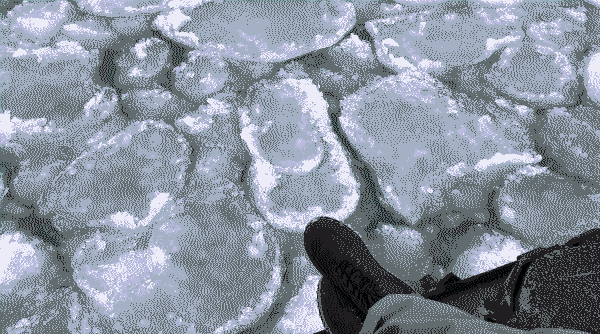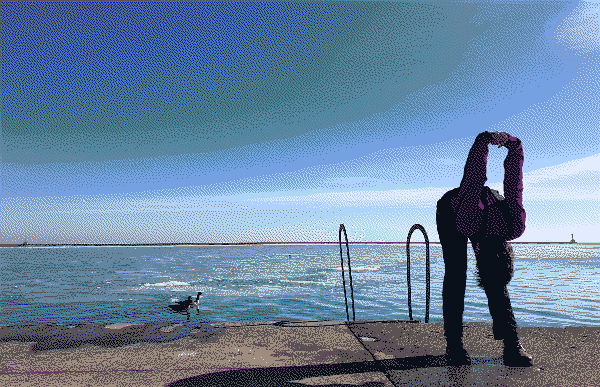I am thinking about ice. Living in a Chicago winter (yet again), I am surprised that a body of water so big can freeze. Lake Michigan (though unsalted) is easy to mistake for an ocean, given its size. On the surface of the lake, the ice shifts and glints. Clicks, softly, against the open sky. When ice hits the lakeside beaches, the wave’s runoff freezes in shape, building the ghost of a wave (similar to how stalactites form). Ice is solid. Left unattended, it accumulates abruptly on the windshield, on the edges of the street, off of drainage systems. It is hard to imagine its absence. Until, of course, the start of spring.

taken at the shore of Lake Michigan, 1/29/23
Ice is fleeting. Melting, I mean, and rapidly. As I age (a paltry 25), I find myself mourning those things that are old and fleeting (like ice).
What I mean is something so obvious it is worth being said: Ice is beautiful. And it will be gone some time soon, at different scales (snow, glaciers) and time frames (months, decades). What will it be like when no one remembers the ice?

Jamie and two geese at the shore of Lake Michigan, 2/5/23
Below are three sections of text about ice, elegy or ode. The first is a section of a poem which I wrote last year. The second, I encountered in a book by Unknown Fields. The third is (of course) from Time is the Thing a Body Moves Through and the paragraph is in reference to Lake Michigan.
Here is the first:
I am thinking about ice. The way it creaks. Squeaks. Creaks.
In the winter, by the lakefront with a friend: we sat by the observatory.
The ice, on the lake, was in sections. The snow dusting each edge.
And it creaked. As large things do, sometimes.
(I wonder: does water enjoy being ice?)
This year there was so little ice. It was mostly melted (into water, then).
Gone! As large things do, I am learning.
The second:
It does not make much sense to mourn the things
I will never know
But that isn't stopping me from doing it.
Beyond that vast sea
are the things I don't even know I don't know.
And beneath that, the limitless blue-black galaxy
of what I'll never even come close to imagining.
One evening I was told a hunting story. They
walked on snowshoes around mountains. It only
took the old man five, six minutes to skin a
tuttu. Their tracks a distant white line and
it was seventy degrees below zero that night.
Sometimes, years ago, no one came back with food
and all the child had was lard and wandering
wishes skittering in the cold. Grownups eager
to push away from winter's camp.
I've already forgotten so much that was said.
Here is a little I remember.
You can leave a caribou with its feet poking up
and the ravens will leave it alone. Some people
like to make their quaq that way. The Inupiag
words I'm so pleased my son uses are not even
fragments of our language. Shards is too sharp
and they're more happily and lovingly employed.
Bits is even too big. And they're small. So
small. Atoms, maybe.
I've heard people say they've forgotten more
than they know. We're standing here on an edge
with it all falling toward and away at the same
time. Feeling so much, like it's all just there
on the other side. Not enough falling through
me will catch. My blind eyes and dampened ears
will never know.
And so much is gone, gone.
-PNH, Snowing in the Supercomputer, edited by Unknown Fields
The third:
“... or the sheen of ice screeches. The sheen of ice screeches white
ice screeches. The white sheen of silver ice screeches. The silver
screech of ice has a sheen. The sheen of ice screeches, screech
screech, and it was a sheen. It had a sheen, the silver ice. The silver
ice has a sheen. Let’s sing…”
-T Fleischmann, Time is the Thing a Body Moves Through, p. 151
---
Stay warm... or cold,
🧊emrys
sent 2/12/25
